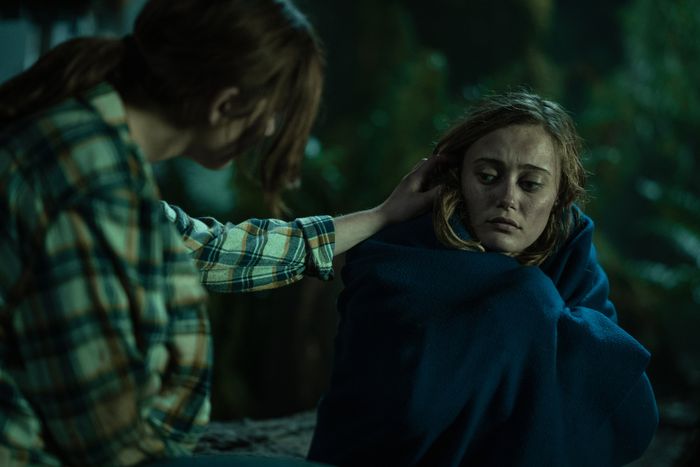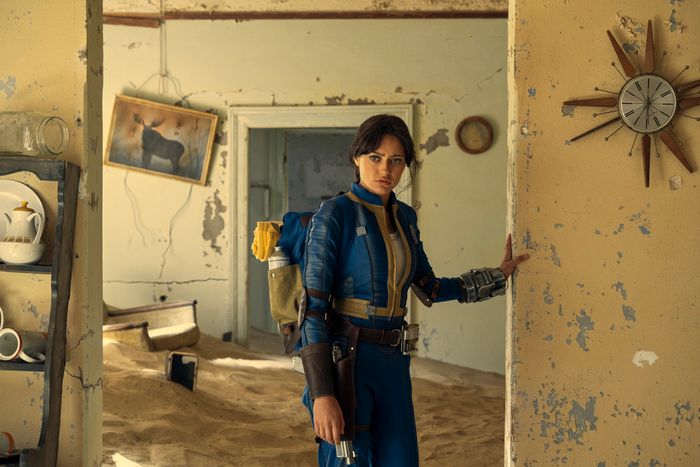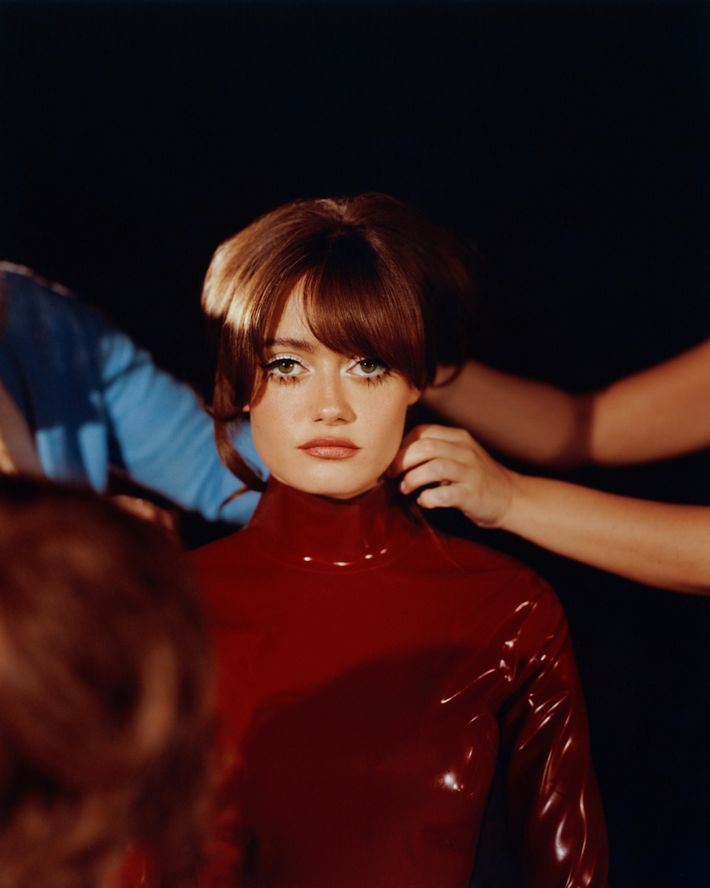On a recent Friday night in Silver Lake, I arrive late to a pottery studio to meet Ella Purnell for a beginners’ class, where, eager to make her first ceramic creation, she has saved me a seat next to her. She’s wearing an oversize New York Rangers sweatshirt, white canvas pants, and sneakers, but just a couple of hours ago she was in full retro glam for a photo shoot in Culver City; her hair is clipped back around her face, maintaining a curl that could have been facilitated only by someone else. Before we get our hands dirty, the instructor asks the eight of us to go around and introduce ourselves, describe our passions, and say where we live. He encourages us to share not just our day job but our practice. “I’d rather hear that you’re a writer instead of whatever shitty job you work,” he says. (By admitting that I am a writer, I suddenly feel like I am concealing some shitty job.) Purnell says she’s an actor. She adds, in her gravelly voice and bright British accent, “And I live just up the road,” as if this were a small town and we were all neighbors.
Purnell smiles at the instructor’s bad jokes while trying, and somewhat failing, to follow the intricate steps. “I want to make something really weird for someone I hate,” she jokes, something they can’t throw away because she made it, a kind of burden in disguise. We sit with lumps of clay in front of us, giggling in embarrassment at our amateurism.
The 27-year-old is the star of the hit Amazon show Fallout, based on the video-game franchise of the same name. According to Nielsen, it was the most streamed show in April, beating out established series with massive audiences like Bluey and Grey’s Anatomy. It’s already renewed for a second season. The game launched in 1997 and strays from the typical fantasy worlds that had dominated role-playing games up to that point. Its postapocalyptic setting influenced a new era of computer games set in the future instead of the past. Purnell’s character in the show, Lucy MacLean, grows up in an underground vault in Los Angeles following a nuclear war. We meet Lucy in 2296, a couple of centuries after the bombs dropped. She starts out as a peppy rule-follower eager to help repopulate America — even if it means marrying and immediately having sex with a stranger from another vault — but is quickly forced to face the big bad world outside when her father (Kyle MacLachlan) is kidnapped.
Lucy’s fearlessness and determination emerge early. After she kills her dangerous new husband amid an uprising in a pivotal scene from the first episode, she’s the only vault dweller who opts to investigate aboveground. Her cousin and a few others from her vault warn her that she’s putting herself in extreme danger and plead with her to stay. As the door opens, it’s the first time we see Lucy’s face in natural light instead of fluorescents, which give her a synthetic look. In the sunlight, the wind on her face, she steps into the wasteland with a curious excitement, a desire to confront the unknown alone. “Okey dokey!” she chirps, as she often does. As the show progresses, she’s challenged by the violence of the wastelands and has to compromise her ethics for the sake of saving her father. She realizes she’s capable of brutality. In one gory scene, she surprises herself as much as her victim, the Ghoul (Walton Goggins), biting off his finger in one swift motion. He cuts off hers in retaliation, calling this the “closest thing to an honest exchange” they have had so far. Lucy’s concept of morality begins to crumble here — honesty becomes something more complex.
“There were so many memorable days working with Ella, but none more than the first,” Goggins says. In the third episode, the Ghoul ties up Lucy and tortures her, dangling her underwater as bait for a giant mutant creature they’re both trying to find. Goggins recalls director and executive producer Jonathan Nolan moving fast on set to beat the heat. “We were all figuring out who these people were separately and together,” he says. “Every take Ella did was a home run. It is not easy to be dunked in the water for ten hours straight.”
Purnell is strikingly self-assured in person. For coffee the morning after class, she arrives makeupless and purseless; she just has a carabiner with keys to her Toyota and a worn-in Ralphs rewards card. Fallout is her biggest role to date, but she is hardly a beginner. “I’m not 100 percent cynical yet, but I’m definitely weathered,” she says. She was modeling in front of the camera by age 2 and booked her first commercial when she was around 8. As a teenager, she starred in a number of shows and movies, most notably as a teenage Maleficent in Maleficent and as Emma Bloom in Tim Burton’s Miss Peregrine’s Home for Peculiar Children. In her breakthrough role as an adult on Showtime’s Yellowjackets, Purnell played Jackie, the team captain of a girls’ soccer team whose plane crashes in the wilderness. Emblematic of teenage girlhood with both an unbridled boldness and ennui, Jackie was a fan favorite who ends up being eaten by the other girls in their desperate reach for survival; one fan on Reddit wrote that the character’s only crime was “being a teenage girl :’(.” In Starz’s Sweetbitter, Purnell’s first major lead role, she played Tess, a 22-year-old who finds herself after moving to New York to work in the service industry. Purnell is also the voice of Jinx (another gamer fan favorite), a complex villain in Arcane, the Netflix adaptation of the game League of Legends. All of her recent characters start out with a kind of innocence: They are often good girls, perhaps a little naïve, who have yet to be hardened by life.
Purnell is not all bright-eyed and bushy-tailed about her job, as aware of its drawbacks as she is of its perks. “I feel like I fall in and out of love with acting all the time,” she says between sips of her oat-milk latte. “It’s already hard enough when you’re in your 20s and you’re trying to figure out who you are and what you want to do without this added thing of, like, I’ve only ever done one thing. How do I know it’s the one? We romanticize all occupations because I think we confuse them with our life’s purpose.”
She grew up in London, where her mother is a yoga teacher and her father, she tells me skeptically, “works in technology.” (“I couldn’t tell you exactly what he does,” she says.) Her mother had friends and family who saw Ella as a little girl and thought she would be perfect in front of the camera. Purnell says she loved to sing and began taking singing and acting lessons around age 7; as a teen, she sacrificed some aspects of normal adolescence for the sake of her career. When she was 18, she had to decide if she wanted to keep acting. At the time, she also wanted to go to university, to write, to be a therapist or a teacher. “I was like, Okay, I’m done with school. Acting was a fun little side hustle that’s going to fund my gap year. I’m gonna travel the world and find myself,” she says, laughing. “I wouldn’t say I did. I drank a lot. I saw a lot of Australia very drunk.” For the first time, Purnell was away from home, and, like any 18-year-old, she attempted a reinvention. She wore a fake septum piercing that she told everyone was real. “I was trying on all these different personalities that were actually mine. They weren’t characters,” she says.
Just after this period of self-exploration, she was offered her big break in Miss Peregrine’s Home for Peculiar Children. She had been an admirer of movies by filmmakers with an idiosyncratic vision and distinct style — films with a trademark look that could have been made only by one person. “I didn’t have many dreams, but I had one and it was to work with Tim Burton or Wes Anderson. And I got it,” she says. “At the same time, I was like, Fuck, no, this was my chance to go to university and start a different life.” Choosing the movie, she says, “was kind of bittersweet.”
She stands by her decision: “Looking back, it’s exactly what should have happened. I’m glad I stuck with acting. I had to fall in love with it on my own account and not because of my family or my friends. Now I love it. Now I choose to do it. I had to figure that out by myself.”


In 2019, Sweetbitter, the show that had led Purnell to do television work in the U.S., was canceled after its second season. Her sweet spot since has been in adaptations and TV shows based on existing IP, but she isn’t deliberately trying to be a genre star. “I have a friend who just wants to be an action star. She works out like crazy. She exclusively auditions for action films. I don’t have that,” Purnell says. “My only real requirement is that I just want to do something different every single time, which is a nightmare for my team. They hate it because they’re like, ‘Well, how are we …,’ and I’m like, ‘Just send me everything and I’ll read it.’” (She is reportedly set to star in a comedy-horror film from Craig Roberts about killer squirrels.) Aaron Moten, her Fallout co-star, considers Purnell an “incredible advocate for everyone on set.” He’s not surprised she’s jumping into executive-producing her next project, Sweetpea, a series in which she’ll also star. “She’s kind of built for it mentally,” he says.
Purnell splits her time between L.A. and London but has recently become more settled here, no longer picking up and moving wherever the work leads her. When she’s not acting, Purnell says, she’s pretty introverted. She doesn’t go out much; she cooks, she gardens, she sees her “friend family,” she takes care of her dog. She has been with her musician boyfriend, Max Bennett Kelly, for two and a half years, and they recently collaborated on a short film, Junk Male, which he starred in and she directed. “That’s my little life, and I want to find joy in that,” she says. But any young star is fresh meat for the tabloids — in the past, she has been the subject of dating rumors involving Brad Pitt and Tom Holland. Purnell got a kick out of it. Of the Pitt rumor, she told the Independent, “I went to bed and the next day it was fucking everywhere. I was terrified and really upset. I felt like I couldn’t leave the house, I was so embarrassed.” Family members even texted to congratulate her.
Recently, she attended a Renaissance Faire and the Stagecoach Festival and was approached by fans, something she’s still not quite used to — often she’ll think people are simply asking for directions. “I’m aware that Fallout has increased my profile and my visibility. I see my Instagram follower count rising. But this is all being processed on the outer shell of my brain,” she says. “Because I’ve been doing this for so long, whether a show has done really well or has completely flopped, my inner core remains unchanged. And if you hated it and hated me, I would feel the same way inside. Because you can’t let that affect you. Otherwise, it’ll kill you.” Although she knows what it’s like: “I have probably got lost in it before. I’ve cared too much about what I look like or about how paparazzi pictures come out. I’ve cared too much about my follower count or comparing myself to friends. And it’s just misery-making.”
She has learned a few things about what’s important to her from her time in Hollywood so far: “I don’t want to work with shitheads. I don’t want to work with people I don’t get on with. My life is too short to be stuck for nine months in Arkansas with an asshole. I just want to work with good people on stuff that I feel challenged by.” She craves risk and having something at stake. “Even if the script is amazing, if the character is not exciting to me — if I feel like I could play it standing on my head — then it’s not interesting,” she says. “I want to feel nervous. I want to feel like I could fuck it up.”
More on ‘fallout’
- Walton Goggins Knows Every Moment of The Ghoul’s Life
- Is Fallout’s Binge Release Hurting Its Emmy Chances?
- Walton Goggins Elevates It
